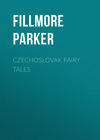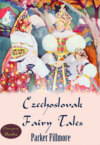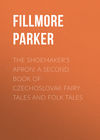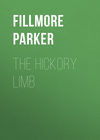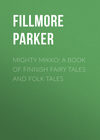Kitabı oku: «Czechoslovak Fairy Tales», sayfa 7
THE WOOD MAIDEN
THE STORY OF BETUSHKA AND THE GOLDEN BIRCH LEAVES
THE WOOD MAIDEN
BETUSHKA was a little girl. Her mother was a poor widow with nothing but a tumble-down cottage and two little nanny-goats. But poor as they were Betushka was always cheerful. From spring till autumn she pastured the goats in the birch wood. Every morning when she left home her mother gave her a little basket with a slice of bread and a spindle.
“See that you bring home a full spindle,” her mother always said.
Betushka had no distaff, so she wound the flax around her head. Then she took the little basket and went romping and singing behind the goats to the birch wood. When they got there she sat down under a tree and pulled the fibers of the flax from her head with her left hand, and with her right hand let down the spindle so that it went humming along the ground. All the while she sang until the woods echoed and the little goats nibbled away at the leaves and grass.
When the sun showed midday, she put the spindle aside, called the goats and gave them a mouthful of bread so that they wouldn’t stray, and ran off into the woods to hunt berries or any other wild fruit that was in season. Then when she had finished her bread and fruit, she jumped up, folded her arms, and danced and sang.
The sun smiled at her through the green of the trees and the little goats, resting on the grass, thought: “What a merry little shepherdess we have!”
After her dance she went back to her spinning and worked industriously. In the evening when she got home her mother never had to scold her because the spindle was empty.
One day at noon just after she had eaten and, as usual, was going to dance, there suddenly stood before her a most beautiful maiden. She was dressed in white gauze that was fine as a spider’s web. Long golden hair fell down to her waist and on her head she wore a wreath of woodland flowers.
Betushka was speechless with surprise and alarm.
The maiden smiled at her and said in a sweet voice:
“Betushka, do you like to dance?”
Her manner was so gracious that Betushka no longer felt afraid, and answered:
“Oh, I could dance all day long!”
“Come, then, let us dance together,” said the maiden. “I’ll teach you.”
With that she tucked up her skirt, put her arm about Betushka’s waist, and they began to dance. At once such enchanting music sounded over their heads that Betushka’s heart went one-two with the dancing. The musicians sat on the branches of the birch trees. They were clad in little frock coats, black and gray and many-colored. It was a carefully chosen orchestra that had gathered at the bidding of the beautiful maiden: larks, nightingales, finches, linnets, thrushes, blackbirds, and showy mocking-birds.
Betushka’s cheeks burned, her eyes shone. She forgot her spinning, she forgot her goats. All she could do was gaze at her partner who was moving with such grace and lightness that the grass didn’t seem to bend under her slender feet.
They danced from noon till sundown and yet Betushka wasn’t the least bit tired. Then they stopped dancing, the music ceased, and the maiden disappeared as suddenly as she had come.
Betushka looked around. The sun was sinking behind the wood. She put her hands to the unspun flax on her head and remembered the spindle that was lying unfilled on the grass. She took down the flax and laid it with the spindle in the little basket. Then she called the goats and started home.
She reproached herself bitterly that she had allowed the beautiful maiden to beguile her and she told herself that another time she would not listen to her. She was so quiet that the little goats, missing her merry song, looked around to see whether it was really their own little shepherdess who was following them. Her mother, too, wondered why she didn’t sing and questioned her.
“Are you sick, Betushka?”
“No, dear mother, I’m not sick, but I’ve been singing too much and my throat is dry.”
She knew that her mother did not reel the yarn at once, so she hid the spindle and the unspun flax, hoping to make up tomorrow what she had not done today. She did not tell her mother one word about the beautiful maiden.
The next day she felt cheerful again and as she drove the goats to pasture she sang merrily. At the birch wood she sat down to her spinning, singing all the while, for with a song on the lips work falls from the hands more easily.
Noonday came. Betushka gave a bit of bread to each of the goats and ran off to the woods for her berries. Then she ate her luncheon.
“Ah, my little goats,” she sighed, as she brushed up the crumbs for the birds, “I mustn’t dance today.”
“Why mustn’t you dance today?” a sweet voice asked, and there stood the beautiful maiden as though she had fallen from the clouds.
Betushka was worse frightened than before and she closed her eyes tight. When the maiden repeated her question, Betushka answered timidly:
“Forgive me, beautiful lady, for not dancing with you. If I dance with you I cannot spin my stint and then my mother will scold me. Today before the sun sets I must make up for what I lost yesterday.”
“Come, child, and dance,” the maiden said. “Before the sun sets we’ll find some way of getting that spinning done!”
She tucked up her skirt, put her arm about Betushka, the musicians in the treetops struck up, and off they whirled. The maiden danced more beautifully than ever. Betushka couldn’t take her eyes from her. She forgot her goats, she forgot her spinning. All she wanted to do was to dance on forever.
At sundown the maiden paused and the music stopped. Then Betushka, clasping her hands to her head, where the unspun flax was twined, burst into tears. The beautiful maiden took the flax from her head, wound it round the stem of a slender birch, grasped the spindle, and began to spin. The spindle hummed along the ground and filled in no time. Before the sun sank behind the woods all the flax was spun, even that which was left over from the day before. The maiden handed Betushka the full spindle and said:
“Remember my words:
“Reel and grumble not!
Reel and grumble not!”
When she said this, she vanished as if the earth had swallowed her.
Betushka was very happy now and she thought to herself on her way home: “Since she is so good and kind, I’ll dance with her again if she asks me. Oh, how I hope she does!”
She sang her merry little song as usual and the goats trotted cheerfully along.
She found her mother vexed with her, for she had wanted to reel yesterday’s yarn and had discovered that the spindle was not full.
“What were you doing yesterday,” she scolded, “that you didn’t spin your stint?”
Betushka hung her head. “Forgive me, mother. I danced too long.” Then she showed her mother today’s spindle and said: “See, today I more than made up for yesterday.”
Her mother said no more but went to milk the goats and Betushka put away the spindle. She wanted to tell her mother her adventure, but she thought to herself: “No, I’ll wait. If the beautiful lady comes again, I’ll ask her who she is and then I’ll tell mother.” So she said nothing.
On the third morning she drove the goats as usual to the birch wood. The goats went to pasture and Betushka, sitting down under a tree, began to spin and sing. When the sun pointed to noon, she laid her spindle on the grass, gave the goats a mouthful of bread, gathered some strawberries, ate her luncheon, and then, giving the crumbs to the birds, she said cheerily:
“Today, my little goats, I will dance for you!”
She jumped up, folded her arms, and was about to see whether she could move as gracefully as the beautiful maiden, when the maiden herself stood before her.
“Let us dance together,” she said. She smiled at Betushka, put her arm about her, and as the music above their heads began to play, they whirled round and round with flying feet. Again Betushka forgot the spindle and the goats. Again she saw nothing but the beautiful maiden whose body was lithe as a willow shoot. Again she heard nothing but the enchanting music to which her feet danced of themselves.
They danced from noon till sundown. Then the maiden paused and the music ceased. Betushka looked around. The sun was already set behind the woods. She clasped her hands to her head and looking down at the unfilled spindle she burst into tears.
“Oh, what will my mother say?” she cried.
“Give me your little basket,” the maiden said, “and I will put something in it that will more than make up for today’s stint.”
Betushka handed her the basket and the maiden took it and vanished. In a moment she was back. She returned the basket and said:
“Look not inside until you’re home!
Look not inside until you’re home!”
As she said these words she was gone as if a wind had blown her away.
Betushka wanted awfully to peep inside but she was afraid to. The basket was so light that she wondered whether there was anything at all in it. Was the lovely lady only fooling her? Halfway home she peeped in to see.
Imagine her feelings when she found the basket was full of birch leaves! Then indeed did Betushka burst into tears and reproach herself for being so simple. In her vexation she threw out a handful of leaves and was going to empty the basket when she thought to herself:
“No, I’ll keep what’s left as litter for the goats.”
She was almost afraid to go home. She was so quiet that again the little goats wondered what ailed their shepherdess.
Her mother was waiting for her in great excitement.
“For heaven’s sake, Betushka, what kind of a spool did you bring home yesterday?”
“Why?” Betushka faltered.
“When you went away this morning I started to reel that yarn. I reeled and reeled and the spool remained full. One skein, two skeins, three skeins, and still the spool was full. ‘What evil spirit has spun that?’ I cried out impatiently, and instantly the yarn disappeared from the spindle as if blown away. Tell me, what does it mean?”
So Betushka confessed and told her mother all she knew about the beautiful maiden.
“Oh,” cried her mother in amazement, “that was a wood maiden! At noon and midnight the wood maidens dance. It is well you are not a little boy or she might have danced you to death! But they are often kind to little girls and sometimes make them rich presents. Why didn’t you tell me? If I hadn’t grumbled, I could have had yarn enough to fill the house!”
Betushka thought of the little basket and wondered if there might be something under the leaves. She took out the spindle and unspun flax and looked in once more.
“Mother!” she cried. “Come here and see!”
Her mother looked and clapped her hands. The birch leaves were all turned to gold!
Betushka reproached herself bitterly: “She told me not to look inside until I got home, but I didn’t obey.”
“It’s lucky you didn’t empty the whole basket,” her mother said.
The next morning she herself went to look for the handful of leaves that Betushka had thrown away. She found them still lying in the road but they were only birch leaves.
But the riches which Betushka brought home were enough. Her mother bought a farm with fields and cattle. Betushka had pretty clothes and no longer had to pasture goats.
But no matter what she did, no matter how cheerful and happy she was, still nothing ever again gave her quite so much pleasure as the dance with the wood maiden. She often went to the birch wood in the hope of seeing the maiden again. But she never did.
THE GOLDEN SPINNING WHEEL
THE STORY OF KING DOBROMIL AND THE GOOD DOBRUNKA
THE GOLDEN SPINNING WHEEL
THERE was once a poor woman who had twin daughters. The girls were exactly alike in face and feature but utterly different in disposition. Dobrunka was kind, industrious, obedient, and everything a good girl ought to be. Zloboha, her sister, was spiteful, disobedient, lazy, and proud. In fact, she had just about as many faults as a person could have. Yet strange to say the mother loved Zloboha much better and made everything easy for her.
They lived in a cottage a few miles from town. The cottage stood by itself in a little clearing in the woods. Hardly any one ever passed it except occasionally some man who had lost his way in the woods.The mother put her favorite, Zloboha, out to service so that she might learn city ways, but she kept Dobrunka at home to do the housework and take care of the garden. Dobrunka always began the day by feeding the goats, then she prepared the breakfast, swept the kitchen, and when everything else was done she sat down at her spinning wheel and spun.She seldom benefited from the yarn she spun so carefully, for her mother always sold it in town and spent the money on clothes for Zloboha. Yet Dobrunka loved her mother although she never had a kind word or a kind look from her the whole day long. She always obeyed her mother instantly and without a frown and no one ever heard her complain about all the work she had to do.
They lived in a cottage a few miles from town. The cottage stood by itself in a little clearing in the woods. Hardly any one ever passed it except occasionally some man who had lost his way in the woods.
The mother put her favorite, Zloboha, out to service so that she might learn city ways, but she kept Dobrunka at home to do the housework and take care of the garden. Dobrunka always began the day by feeding the goats, then she prepared the breakfast, swept the kitchen, and when everything else was done she sat down at her spinning wheel and spun.
She seldom benefited from the yarn she spun so carefully, for her mother always sold it in town and spent the money on clothes for Zloboha. Yet Dobrunka loved her mother although she never had a kind word or a kind look from her the whole day long. She always obeyed her mother instantly and without a frown and no one ever heard her complain about all the work she had to do.
One day when her mother was going to town Dobrunka went part of the way with her, carrying her yarn wrapped up in a kerchief.
“Now see that you’re not lazy while I’m away,” her mother said, crossly.
“You know, mother, you never have to nag at me. Today when I finish the housework, I’ll spin so industriously that you’ll be more than satisfied when you get home.”
She handed her yarn to her mother and went back to the cottage. Then when she had put the kitchen in order, she sat down to her wheel and began to spin. Dobrunka had a pretty voice, as pretty as any of the song-birds in the forest, and always when she was alone she sang. So today as she sat spinning she sang all the songs she knew, one after the other.
Suddenly she heard outside the trample of a horse. “Some one is coming,” she thought to herself, “someone who has lost his way in the woods. I’ll go see.”
She got up from her wheel and peeped out through the small window. A young man was just dismounting from a spirited horse.
“Oh,” thought Dobrunka to herself, “what a handsome young lord he is! How well his leather coat fits him! How well his cap with its white feather looks on his black hair! Ah, he is tying his horse and is coming in. I must slip back to my spinning.”
The next moment the young man opened the door and stepped into the kitchen. All this happened a long time ago, you see, when there were no locks or bars on the doors, and there didn’t have to be because nothing was ever stolen.
“Good day to you, my girl,” the young man said to Dobrunka.
“Good day, sir,” Dobrunka answered. “What is it, sir, you want?”
“Will you please get me a little water. I’m very thirsty.”
“Certainly,” Dobrunka said. “Won’t you sit down while I’m getting it?”
She ran off, got the pitcher, rinsed it out, and drew some fresh water from the well.
“I wish I could give you something better, sir.”
“Nothing could taste better than this,” he said, handing her back the empty pitcher. “See, I have taken it all.”
Dobrunka put the pitcher away and the young man, while her back was turned, slipped a leather bag, full of money, into the bed.
“I thank you for the drink,” he said, as he rose to go. “I’ll come again tomorrow if you’ll let me.”
“Come if you want to,” Dobrunka said, modestly.
He took her hand, held it a moment, then leaped upon his horse and galloped off.
Dobrunka sat down again to her wheel and tried to work, but her mind wandered. The image of the young man kept rising before her eyes and I have to confess that, for an expert spinner, she broke her thread pretty often.
Her mother came home in the evening full of praises of Zloboha, who, she said, was growing prettier day by day. Everybody in town admired her and she was fast learning city ways and city manners. It was Zloboha this and Zloboha that for hours.
Finally the old woman remarked: “They say there was a great hunting party out today. Did you hear anything of it?”
“Oh, yes,” Dobrunka said. “I forgot to tell you that a young huntsman stopped here to ask for a drink. He was handsomely dressed in leather. You know once when I was in town with you we saw a whole company of men in leather coats with white feathers in their caps. No doubt this young man belonged to the hunting party. When he had his drink, he jumped on his horse and rode off.”
Dobrunka forgot to mention that he had taken her hand in parting and promised to come back next day.
When Dobrunka was preparing the bed for the night, the bag of money fell out. In great surprise she picked it up and handed it to her mother.
The old woman looked at her sharply.
“Dobrunka, who gave you all this money?”
“Nobody gave it to me, mother. Perhaps the huntsman slipped it into the bed. I don’t know where else it could have come from.”
The old woman emptied the bag on the table. They were all gold pieces.
“Good heavens, so much!” she murmured in amazement. “He must be a very rich young lord! Perhaps he saw how poor we were and thought to do a kind deed. May God grant him happiness!”
She gathered the money together and hid it in the chest.
Usually when Dobrunka went to bed after her day’s work she fell asleep at once, but tonight she lay awake thinking of the handsome young rider. When she did at last fall asleep it was to dream of him. He was a powerful young lord, it seemed to her, in her dream. He lived in a great palace and she, Dobrunka, was his wife. She thought that they were giving a fine banquet to which all the nobles in the land had been invited. She and her husband arose from the table and went together into another room. He was about to put his arms about her and embrace her when suddenly a black cat sprang between them and buried its claws in Dobrunka’s breast. Her heart’s blood spurted out and stained her white dress. She cried out in fright and pain and the cry awoke her.
“What a strange dream,” she thought to herself. “I wonder what it means. It began so beautifully but the cruel cat spoiled it all. I fear it bodes something ill.”
In the morning when she got up, she was still thinking of it.
On other mornings it didn’t take Dobrunka long to dress but this morning she was very slow. She shook out her fresh skirt again and again. She had the greatest trouble in putting on her bodice just right. She spent much time on her hair, into which she plaited the red ribbon that she usually kept for holidays. When at last she was dressed and ready to go about her household duties she looked very fresh and sweet.
As midday came, she found it hard to sit still at her wheel, but kept jumping up on any pretext whatever to run outdoors a moment to see if the young horseman was in sight.
At last she did see him at a distance and, oh, how she hurried back to her stool so that he would never think that she was watching for him.
He rode into the yard, tied his horse, and came into the cottage.
“Good day, Dobrunka,” he said, speaking very gently and very respectfully.
Dobrunka’s heart was beating so fast that she feared it would jump out of her body. Her mother was in the woods gathering fagots, so she was again alone with him. She managed to return his greeting and to ask him to sit down. Then she went back to her spinning.
The young man came over to her and took her hand.
“How did you sleep, Dobrunka?”
“Very well, sir.”
“Did you dream?”
“Yes, I had a very strange dream.”
“Tell me about it. I can explain dreams very well.”
“But I can’t tell this dream to you,” Dobrunka said.
“Why not?”
“Because it’s about you.”
“That’s the very reason you ought to tell me,” the young man said.
He urged her and begged her until at last Dobrunka did tell him the dream.
“Well now,” he said, “that dream of yours except the part about the cat can be realized easily enough.”
Dobrunka laughed. “How could I ever become a fine lady?”
“By marrying me,” the young man said.
Dobrunka blushed. “Now, sir, you are joking.”
“No, Dobrunka, this is no joke. I really mean it. I came back this morning to ask you to marry me. Will you?”
Dobrunka was too surprised to speak, but when the young man took her hand she did not withdraw it.
Just then the old woman came in. The young man greeted her and without any delay declared his intentions. He said he loved Dobrunka and wished to make her his wife and that all he and Dobrunka were waiting for was the mother’s consent.
“I have my own house,” he added, “and am well able to take care of a wife. And for you too, dear mother, there will always be room in my house and at my table.”
The old woman listened to all he had to say and then very promptly gave her blessing.
“Then, my dear one,” the young man said to Dobrunka, “go back to your spinning and when you have spun enough for your wedding shift, I shall come for you.”
He kissed her, gave his hand to her mother, and, springing on his horse, rode away.
From that time the old woman treated Dobrunka more kindly. She even went so far as to spend on Dobrunka a little of the money the young man had given them, but most of it, of course, went for clothes for Zloboha.
But in those happy days Dobrunka wasn’t worrying about anything as unimportant as money. She sat at her wheel and spun away thinking all the while of her fine young lover. Time sped quickly and before she knew it she had spun enough for her wedding shift.
The very day she was finished her lover came. She heard the trample of his horse and ran out to meet him.
“Have you spun enough for your wedding shift?” he asked her as he took her to his heart.
“Yes,” Dobrunka said, “I have.”
“Then you can ride away with me this moment.”
“This moment!” Dobrunka gasped. “Why so quickly?”
“It has to be, my dear one. Tomorrow I go off to war and want you to take my place at home. Then when I come back you’ll be there to greet me as my wife.”
“But what will my mother say to this?”
“She will have to consent.”
They went into the cottage and spoke to the old woman. She was far from pleased with this arrangement, for she had worked out a very different plan in her mind. But what could she do? A rich young bridegroom always has his own way. So she hid her disappointment with a false smile and gave them her blessing.
Then the young man said to her: “Get your things together, mother, and follow Dobrunka, for I don’t want her to be lonely while I’m gone. When you get to the city, go to the palace and ask for Dobromil. The people there will tell you where to go.”
Dobrunka with tears streaming down her cheeks bid her mother good-by. Dobromil lifted her to the saddle in front of him and away they went like the wind.
The town was in great excitement. There was much hurrying to and fro as the troops were being put in readiness for the morrow. A crowd had gathered at the palace gates and as a young man came galloping up, holding in front of him a lady lovely as the day, the shout went up:
“Here he is! Here he is!”
The people in the courtyard took up the cry and as Dobromil rode through the gate all of them with one voice shouted out:
“Long live our beautiful queen! Long live our noble king!”
Dobrunka was struck with amazement.
“Are you really the king, Dobromil?” she asked, looking into his proud and happy face.
“Yes,” he said. “Aren’t you glad that I am?”
“I love you,” Dobrunka said, “and so whatever you are makes no difference to me. But why did you deceive me?”
“I did not deceive you. I told you that your dream would be realized if you took me for your husband.”
In those early times marriage was a simple affair. When a man and woman loved each other and their parents consented to their union, they were looked upon as married. So Dobromil now was able to present Dobrunka to his people as his wife.
There was great rejoicing, music played, and there was feasting and drinking in the banquet hall until dawn. The next day the young husband kissed his lovely bride farewell and rode off to war.
Left alone the young queen strayed through the magnificent palace like a lost lamb. She would have felt more at home rambling through the woods and awaiting the return of her husband in a little cottage than here where she was a lonely stranger. Yet she was not a stranger long, for within half a day she had won every heart by her sweetness and goodness.
The next day she sent for her mother and the old woman soon arrived bringing with her Dobrunka’s spinning wheel. So now there was no more excuse for loneliness.
Dobrunka supposed that her mother would be made very happy to find what good fortune had befallen her daughter. The old woman pretended she was, but in her heart she was furious that a king had married Dobrunka and not Zloboha.
After a few days she said, very artfully, to Dobrunka: “I know, my dear daughter, that you think your sister, Zloboha, was not always kind to you in times past. She’s sorry now and I want you to forgive her and invite her here to the palace.”
“I should have asked her before this,” said Dobrunka, “but I didn’t suppose she wanted to come. If you wish it, we’ll go for her at once.”
“Yes, dear daughter, I do wish it.”
So the queen ordered the carriage and off they went to fetch Zloboha. When they came to the edge of the woods they alighted and ordered the coachman to await them there. They went on afoot to the cottage where Zloboha was expecting them.
Zloboha came running out to meet them. She threw her arms about her sister’s neck and kissed her and wished her happiness. Then the wicked sister and the wicked mother led poor unsuspecting Dobrunka into the house. Once inside Zloboha took a knife that she had ready and struck Dobrunka. Then they cut off Dobrunka’s hands and feet, gouged out her eyes, and hid her poor mutilated body in the woods. Zloboha and her mother wrapped up the hands and the feet and the eyes to carry them back with them to the palace because they believed that it would be easier for them to deceive the king if they had with them something that had belonged to Dobrunka.
Then Zloboha put on Dobrunka’s clothes and she and her mother rode back to town in the carriage and nobody could tell that she wasn’t Dobrunka. In the palace the attendants soon whispered to each other that their mistress was kinder to them at first, but they suspected nothing.
In the meantime poor Dobrunka, who was not quite dead, had been found by a hermit and carried by him to a cave. She awoke to feel a kind hand soothing her wounds and putting some reviving drops between her lips. Of course, she could not see who it was, for she had no eyes. As she regained consciousness she remembered what had happened and began bitterly to upbraid her unnatural mother and her cruel sister.
“Be quiet. Do not complain,” a low voice said. “All will yet be well.”
“How can all be well,” wept poor Dobrunka, “when I have no eyes and no feet and no hands? I shall never again see the bright sun and the green woods. I shall never again hold in my arms my beloved Dobromil. Nor shall I be able to spin fine flax for his shirts! Oh, what did I ever do to you, wicked mother, or to you, cruel sister, that you have done this to me?”
The hermit went to the entrance of the cave and called three times. Soon a boy came running in answer to the call.
“Wait here till I come back,” the hermit said.
He returned in a short time with a golden spinning wheel in his arms. He said to the boy:
“My son, take this spinning wheel to town to the king’s palace. Sit down in the courtyard near the gate and if any one asks you for how much you will sell the wheel, say: ‘For two eyes.’ Unless you are offered two eyes for it bring it back.”
The boy took the spinning wheel and carried it to town as the hermit directed. He went to the palace and sat down in the courtyard near the gate, just as Zloboha and her mother were returning from a walk.
“Look, mother!” Zloboha cried. “What a gorgeous spinning wheel! I could spin on that myself! Wait. I’ll ask whether it’s for sale.”
She went over to the boy and asked him would he sell the spinning wheel.
“Yes,” he said, “if I get what I want.”
“What do you want?”
“I want two eyes.”
“Two eyes?”
“Yes, two eyes. My father told me to accept nothing for it but two eyes. So I can’t sell it for money.”
The longer Zloboha looked at the spinning wheel the more beautiful it seemed to her and the more she wanted it. Suddenly she remembered Dobrunka’s eyes that she had hidden away.
“Mother,” she said, “as a queen I ought to have something no one else has. When the king comes home he will want me to spin, and just think how lovely I should look sitting at this golden wheel. Now we’ve got those eyes of Dobrunka’s. Let us exchange them for the golden spinning wheel. We’ll still have the hands and feet.”
The mother, who was as foolish as the daughter, agreed. So Zloboha got the eyes and gave them to the boy for the spinning wheel.
The boy hurried back to the forest and handed the eyes to the hermit. The old man took them and gently put them into place. Instantly Dobrunka could see.
The first thing she saw was the old hermit himself with his tall spare figure and long white beard. The last rays of the setting sun shone through the opening of the cave and lighted up his grave and gentle face. He looked to Dobrunka like one of God’s own saints.
“How can I ever repay you?” she said, “for all your loving kindness? Oh, that I could cover your hands with kisses!”
